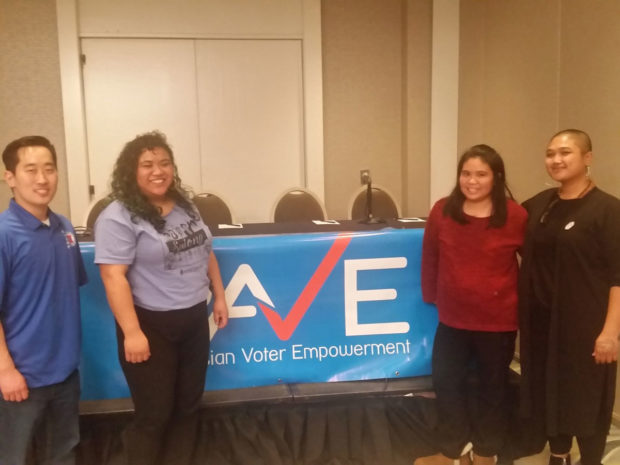Census tags Filipinos in Illinois as ‘hard to count’ residents

Chicagoland community leaders attend the Asian American Census Summit in January hosted by Pan Asian Voter Empowerment Partnership (PAVE). From left to right, Thomas Choi, Kristina Tendilla, this reporter and Danielle De Vera. PINOY
SKOKIE, Illinois — United States residents of Filipinos ancestry have been designated a “hard to count” population by the U.S. Census Bureau, according to Kristina Tendilla, executive director of grassroots organization The Alliance of Filipinos for Immigrant Rights and Empowerment” (AFIRE).
The Filipino American Complete Count Committee (FACCC) will strategize on how best to overcome barriers to census participation, she said in an AFIRE press release.
“AFIRE is working with a coalition of organizations and community leaders to form the FACCC to obtain a complete and accurate count of all Filipinos residing in Cook, Will, DuPage, Lake, McHenry, and Kane counties in Illinois for the forthcoming 2020 U.S Census that starts in April.
The U.S. Census Bureau urges everyone, including undocumented immigrants, to be counted in its 2020 U.S. survey to gather population data that helps the government among other important matters, to decide how to spend federal funds to benefit a community.
“There may be different reasons why Filipinos don’t participate in the Census,” said Tendilla. “They may not know what it is or what it is used for, especially if they are a new immigrant. It is difficult to count Filipinos within the community through the use of the Census because of their distrust of the government and of the citizenship question.”
“One out of four Filipinos in the U.S. are undocumented,” she stated. Undocumented Filipinos should not be concerned about their information being used against them when filling out the 2020 Census form this April,” Tendilla answered.
The Census Bureau is bound by law to keep information confidential under Title 13 of the U.S. Code. It cannot release any identifiable information about U.S. residents, their home, or their businesses even to law enforcement agencies.
Citizenship question
“The question of citizenship will not be asked on the 2020 U.S. Census form,” announced Theresa Le, of the U.S. Census Bureau Chicago. “We really want to be inclusive as possible,” she said during the Asian American Census Summit hosted by the Pan Asian Voter Empowerment Partnership (PAVE) Jan. 31 at DoubleTree Hotel in this village.
PAVE wants to get more responses from areas in the Chicagoland which were the least most likely to respond in the 2010 Census. “We still have a lot of barriers and challenges to mitigate as we go. It’s a tough climate out there but we try our best,” Le added.
Le added that the $675 billion in federal funds from the 2020 Census data will be used to cover healthcare, education, employment, and maintenance of roads and highways for every state, county and community. Illinois Governor J.B. Pritzker has invested $29 million on the Census outreach program.
“It is safe, simple and significant. It takes only 10 minutes to change your life,” Le explained.
The U.S. Constitution mandates that everyone in the country be counted every decade for the U.S. Census. Data results from the Census 2010 showed that 12,830,632 Filipinos (or nine percent of the population) resided in the U.S.
Census participation issues
AFIRE, located in Chicago, provides resources and is available to assist the Filipino-American community on issues of social, racial, and economic justice that affect undocumented immigrants, seniors, domestic workers, and youth.
“We are dealing again with those same certain issues [as in 2010 Census]. If we have these conversations of why this is important, how this can help support our community, we [Filipino Americans] can have visibility, we can be seen. The Census is one vehicle for that,” Tendilla explained.
In July of last year, the U.S. Supreme Court blocked President Trump’s attempts to include the question of U.S. Citizenship on the 2020 Census form. Advocates for the Census feared that the addition of the question would hinder undocumented immigrants from filling out the Census form out of fear that they may be found out and detained.
“A lot of people fought hard to make sure the citizenship question wasn’t on the Census and those protections are really strong,” Tendilla said.
AFIRE wants to make sure that everyone is counted. Ten years ago, Tendilla explained, the tagline in Tagalog said “every Filipino matters” whether they are rich or poor or new immigrant or undocumented.
Households will have until the end of April to mail in their completed Census form. Every household will have the option of responding online, by mail, or by phone. They can visit www.2020census.gov and also retrieve Census data from ten years ago.
AFIRE will be working on outreach efforts that will also address concerns by community members about the confidentiality of their census responses and any perceived consequences with respect to immigration status. She wants everyone to know that anyone can participate in the Census even if they are not a U.S. citizen yet.
The organization is trying to develop ongoing relationships with the Filipino community and training volunteers on how to interact with the Filipino American community for the Census.
“We are looking for folks who have a good sense of where the Filipino American community is, like at churches or social events,” Tendilla said.
“Getting as accurate a count as possible of our often overlooked kababayans helps ensure that our communities will be served properly by the government with the funds they need,” Tendilla emphasized.

